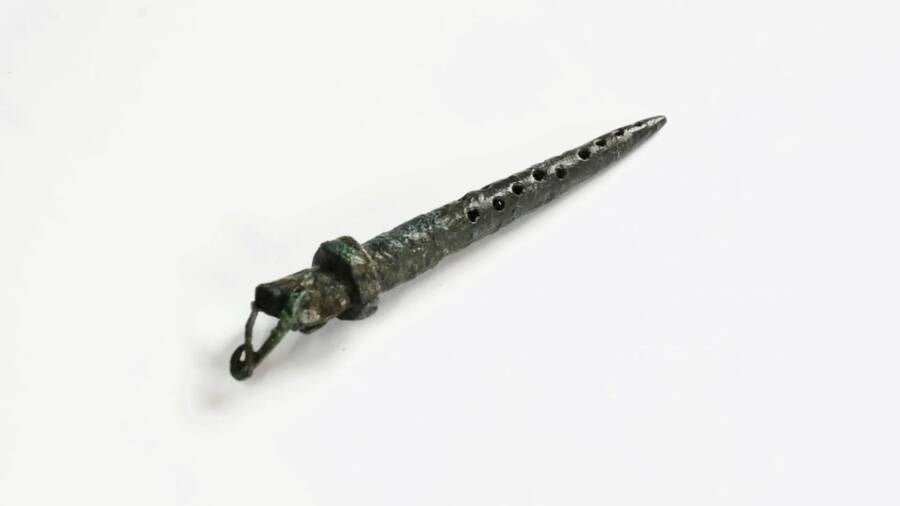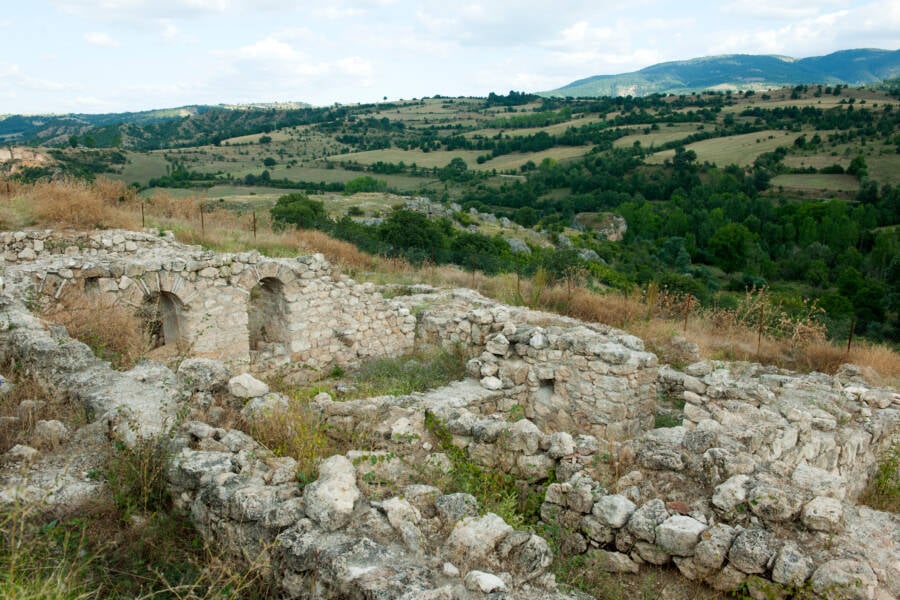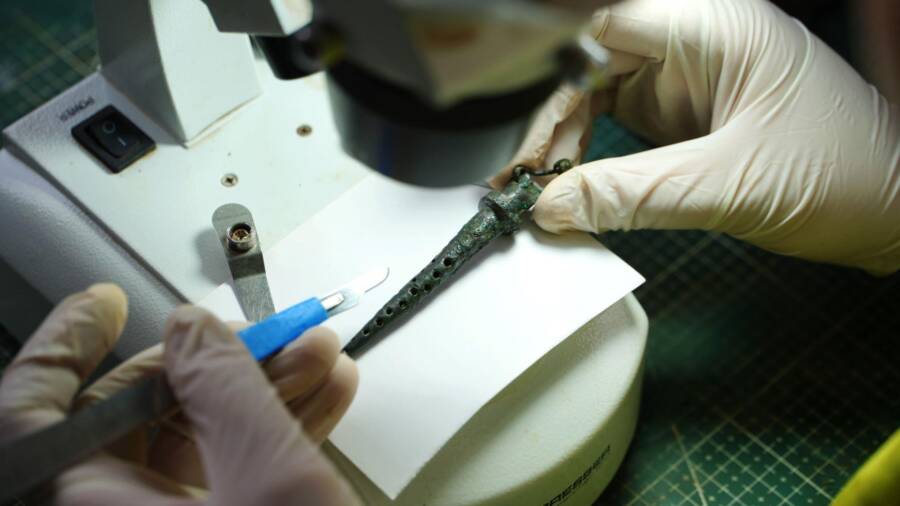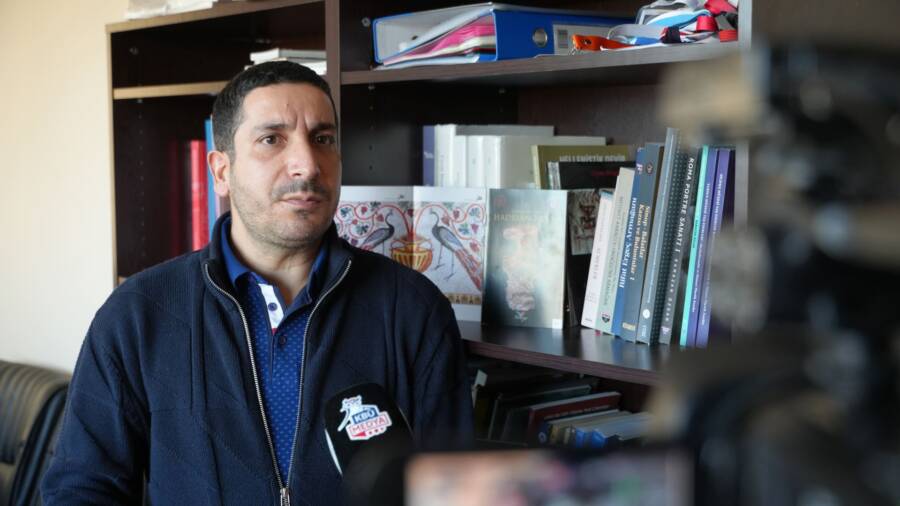Researchers excavating the ruins of Hadrianopolis in western Türkiye discovered a bronze beverage filter that was used to strain impurities from drinks in the 5th century C.E.

Karabük UniversityThe bronze beverage filter from the 5th century C.E. that was unearthed in Hadrianopolis.
Archaeologists excavating Hadrianopolis, an ancient city in western Türkiye, have uncovered a bronze beverage filter from the 5th century C.E. that was designed to strain out impurities from drinks like wine, beer, and fruit juice. Likely meant to be attached to plant-based straws, this filter was built for repeated use.
This discovery helps illuminate the impressive ingenuity and attention to hygiene displayed by the city’s inhabitants some 1,600 years ago.
Excavations At Hadrianopolis Turn Up A 1,600-Year-Old Drinking Filter

Hackenberg-Photo-Cologne/Alamy Stock PhotoRuins of Hadrianopolis in Paphlagonia, Türkiye.
In 2024, Karabük University researchers led by Dr. Ersin Çelikbaş as well as workers from Türkiye’s Ministry of Culture and Tourism excavated the ruins of Hadrianopolis in western Türkiye.
Inhabited between the 1st century B.C.E. and the 8th century C.E., this city was named in honor of Roman emperor Hadrian and is the birthplace of several saints. Because of its long and complex history, the city has long been a hotspot for researchers looking to study its impressive ruins.
Since 2003, archaeologists have uncovered stunning mosaics lining at least 14 of the city’s structures, including bathhouses, churches, fortresses, tombs, villas, and monuments. The site has only grown more popular since the start of Türkiye’s “Heritage for the Future Project,” a government initiative to find and preserve artifacts that shed light on the country’s ancient history.
In 2024, Dr. Ersin Çelikbaş and his archaeological team added a new entry to the list of impressive findings at this ancient site: a bronze filter used to purify beverages roughly 1,600 years ago.
“The bronze filter is a technological tool used to separate the liquid from the large grains and pulp left in the drink,” Dr. Ersin Çelikbaş explained in a press release from Karabük University.
This 3.6-inch bronze cone outfitted with small perforations would be placed at the end of a straw made of reed and would separate out any unwanted solids while allowing liquids to pass through to the user’s mouth.
The discovery has revealed the perhaps surprisingly sophisticated ways in which ancient peoples tackled issues of hygiene, cleanliness, and food preparation in their daily lives.
How Exactly Did Ancient People Use Bronze Filters Like This One?

Karabük UniversityA researcher examines the small filter used to sip beverages some 1,600 years ago.
In the 5th century C.E., around the time of Rome’s fall, Hadrianopolis had a thriving agricultural sector. People in the area widely grew and consumed fruits like pomegranates, apples, and grapes, as well as grains such as wheat and barley.
Beverages like wine, beer, and fruit juices were common, but it appears that people wrestled with discovering ways to best filter residue and impurities from their beverages to make for a better drinking experience, eventually leading to the creation of the bronze filter.
“We see that while drinking these beverages, people attached this filter to the end of straws made from plant materials such as reeds and canes, allowing the beverages to be both filtered and drunk comfortably,” Dr. Ersin Çelikbaş stated.

Karabük UniversityDr. Ersin Çelikbaş oversaw the excavation that turned up the filter.
Additionally, Dr. Ersin Çelikbaş and his team discovered that the filter was meant for repeated use:
“We understand that this object, which is approximately 9.2 centimeters (3.6 inches) long, has a conical shape and a carrying ring on it, was not used by people in ancient times just once. This carrying ring shows us that it was cleaned and preserved after use and used repeatedly. There are holes on this conical bronze object and these holes also performed the function of a filter.”
Ultimately, this discovery highlights the technological ingenuity of Hadrianopolis’ inhabitants more than a millennium and a half ago.
After reading about the beverage filter, dive into Baiae, ancient Rome’s elite party city that is now underwater. Then, read about foricae, the communal Roman bathrooms that made no allowances for privacy.





